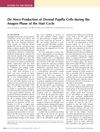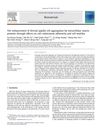 1 citations,
August 2011 in “Planta Medica”
1 citations,
August 2011 in “Planta Medica” Bimatoprost effectively promotes hair growth.
 April 2023 in “Journal of Investigative Dermatology”
April 2023 in “Journal of Investigative Dermatology” A protein called MPZL3 in mitochondria slows down hair growth and could be a target for treating hair growth disorders.
 60 citations,
April 2012 in “Physiology”
60 citations,
April 2012 in “Physiology” The document concludes that understanding hair and feather regeneration can help develop new regenerative medicine strategies.
 June 2024 in “Research Square (Research Square)”
June 2024 in “Research Square (Research Square)” Increased cell death and reduced cell growth in hair follicles contribute to baldness.
 33 citations,
January 1997 in “Endocrinology”
33 citations,
January 1997 in “Endocrinology” Testosterone can slow down hair growth when combined with certain cells from bald scalps, and this effect can be blocked by an androgen receptor blocker.
 November 2022 in “Journal of Investigative Dermatology”
November 2022 in “Journal of Investigative Dermatology” Growing dermal papilla cells in 3D improves their ability to help form new blood vessels.
January 2025 in “International Journal of Biological Macromolecules” Decorin helps hair growth by influencing specific cell signals.
 78 citations,
October 2012 in “Biomaterials”
78 citations,
October 2012 in “Biomaterials” Larger spheroids improve hair growth, but size doesn't guarantee thicker hair.
15 citations,
July 1993 in “The journal of investigative dermatology/Journal of investigative dermatology” Retinoids can change the hair growth cycle by extending the growth phase and shortening the rest phase.
April 2019 in “Journal of Investigative Dermatology” Maca root extract protects hair follicles and promotes hair growth.
 30 citations,
November 2013 in “PLOS ONE”
30 citations,
November 2013 in “PLOS ONE” Androgen receptor signaling causes early aging of cells important for hair growth by damaging their DNA.
 2 citations,
January 2002 in “The Journal of Korean Medicine Ophthalmology and Otolaryngology and Dermatology”
2 citations,
January 2002 in “The Journal of Korean Medicine Ophthalmology and Otolaryngology and Dermatology” Sophora flavescens extract helps hair grow and prevents acne.
 83 citations,
December 2001 in “Journal of Investigative Dermatology”
83 citations,
December 2001 in “Journal of Investigative Dermatology” Minoxidil boosts hair growth by targeting adenosine and possibly sulfonylurea receptor 2B.
 41 citations,
June 2010 in “Journal of Investigative Dermatology”
41 citations,
June 2010 in “Journal of Investigative Dermatology” New cells are added to the hair's dermal papilla during the active growth phase.
 44 citations,
June 2009 in “Biomaterials”
44 citations,
June 2009 in “Biomaterials” Skin cell clumping for hair growth is improved by a protein called fibronectin, which helps cells stick and move better.
January 2006 in “中华医学杂志:英文版” Cultured skin cells can trigger hair growth and the amount of certain proteins they produce affects their ability to regenerate hair follicles.
 7 citations,
June 2021 in “Cell Proliferation”
7 citations,
June 2021 in “Cell Proliferation” Low oxygen levels improve the function of hair and skin cells when they are in direct contact.
 1 citations,
July 2004 in “PubMed”
1 citations,
July 2004 in “PubMed” The study found that higher levels of ET-1 and SCF in early-stage dermal papilla cells improve their ability to regenerate hair follicles.
 2 citations,
August 2019 in “Journal of skin and stem cell”
2 citations,
August 2019 in “Journal of skin and stem cell” The study concludes that regulating apoptosis could lead to new treatments for various skin and hair conditions.
15 citations,
March 2014 in “Acta naturae” Researchers made stem cells from human hair follicle cells with higher efficiency than from skin cells.
 October 2023 in “Journal of Cosmetic Dermatology”
October 2023 in “Journal of Cosmetic Dermatology” A synthetic octapeptide may help promote hair growth and counteract hair loss.
 December 2022 in “한국 미생물 생명공학회지”
December 2022 in “한국 미생물 생명공학회지” TS-SCLF from fermented Schisandra chinensis may promote hair growth and improve hair quality.
 28 citations,
March 2010 in “Histochemistry and cell biology”
28 citations,
March 2010 in “Histochemistry and cell biology” Skin cells can help create early hair-like structures in lab cultures.
 2 citations,
January 2004 in “Enshou saisei”
2 citations,
January 2004 in “Enshou saisei” Male pattern baldness is caused by certain cells in hair follicles and could potentially be treated by targeting a specific growth factor, TGF-β1.

The research identified key molecules that help hair matrix and dermal papilla cells communicate and influence hair growth in cashmere goats.
 August 1994 in “Journal of dermatological science”
August 1994 in “Journal of dermatological science” Different substances affect hair and skin cell growth in various ways, with some promoting and others inhibiting cell proliferation.
 8 citations,
September 2017 in “Scientific Reports”
8 citations,
September 2017 in “Scientific Reports” MAD2B slows down the growth of skin cells that are important for hair development by interacting with TCF4.
 November 2023 in “Materials Today Bio”
November 2023 in “Materials Today Bio” Light therapy might help treat hereditary hair loss by improving hair follicle growth in lab cultures.
 77 citations,
March 2001 in “Clinics in Dermatology”
77 citations,
March 2001 in “Clinics in Dermatology” Androgenetic alopecia involves genetics, hormones, and can be treated with medications or surgery.
 5 citations,
November 2004 in “Japanese journal of geriatrics”
5 citations,
November 2004 in “Japanese journal of geriatrics” Male hormones can cause hair loss, but treatments like Minoxidil and Finasteride can help, and targeting TGF-B1 could be a future solution.

























